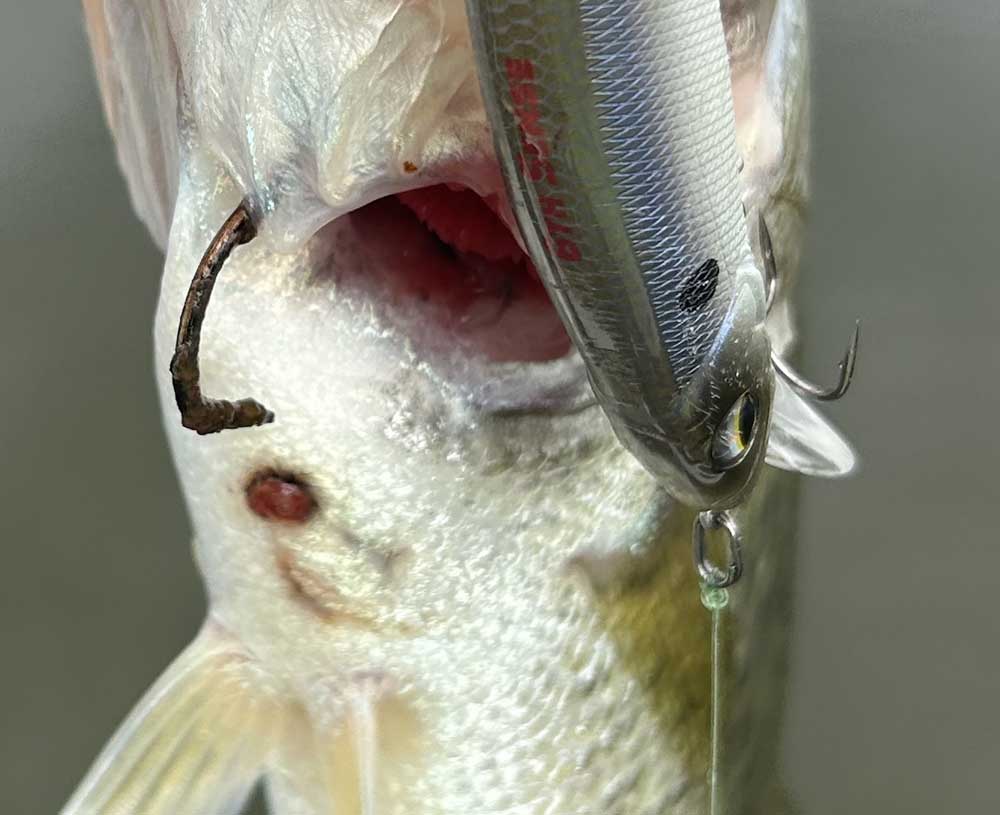Hook, Line and Sinker: Breaking off or landed, not all bass are hooked the same
Published 8:53 pm Friday, November 8, 2024

- Generally, when a bass breaks off there is little thought about what happens to the hook, lure or fish. Chances are the fish is going to survive. (Steve Knight/Tyler Morning Telegraph)
It is an everyday part of bass fishing with the sunken timber and brush in East Texas, but it is still a defeating feeling.
You get a good hookset on a bass only to have it swim straight into nearby brush or lay-down logs and immediately get hung up.
Trending
You loosen the slack and hope the fish works its own way out of the brush. If that falls you inch up over the site to see if there is anything you can. More often than not the only solution is to break the line, re-tie and cast again.
There have been studies over the years on hooking mortality, and there is no doubt that catching a bass and hauling it around in a livewell causes a lot of stress especially in the summer months.
But what about a situation where the line breaks, either intentionally or unintentionally, in which the hook or lure is left in the fish’s mouth. For most fishermen it is an out-of-sight out-of-mind situation.
It always has been for me, or was, until I recently caught a bass with a rusty hook protruding from the side of its mouth. I have always heard they were sometimes able to work the lure or hook out. But what happens if they cannot?
“Several studies have looked at the behavior of fish that are hooked and subsequently break off, but surprisingly none of these studies involved largemouth bass to my knowledge,” explained Jake Norman, Texas Parks and Wildlife Department Inland Fisheries biologist from Tyler.
Norman said that while there are not any studies involving bass, there have been some involving pike. Although that may be an apples-and-oranges comparison, it is the best look possible.
Trending
“Northern pike and similar toothy critters seemed to be the target in most of these studies, likely because breakoffs can be more common. I would argue that adrenaline-crazed, middle-aged males chasing green fish encounter more break offs than all other angling combined, but I know we don’t have data on that,” Norman said.
That said, he added the results of the known studies are not surprising.
“Short-term effects, less than 24 hours, such as swimming behavior, feeding, increased blood cortisol levels, etc. are commonly observed in fish that have a hook or lure still in their mouth. Also, to no surprise, deep hooked fish that retain a hook or lure display longer lasting and more pronounced impacts. However, the majority of break-off fish behaved similarly to control fish typically within seven to 14 days after the break off occurred.
A lot of what fishermen think happens to lures and hooks after a fish breaks off is based on older materials that were not as good as what is used today.
“Overall, very few modern hooks truly rust out enough to become dislodged from fish tissue. Fish will typically dislodge a hook on their own, or the tissue around the hook will soften or rot enough for the hook to fall out,” Norman said.
While there is not anything fishermen can do with fish that break off, that is not the case with fish that are deep hooked. However, deciding whether to leave a hook or attempt to remove it depends on the species, and can require extra effort.
“Cutting the line versus removing a deep hooked fish depends a lot on the species. A fish with a large mouth such as a largemouth bass’s display high survival when the hook is removed, if done properly such as using pliers through gill arches, turn the hook and back the point out. A smaller fish such as sunfish has a much better chance of surviving if the line is cut, versus trying to mess with the hook at all,” Norman said.
Even under the best of conditions, catching a bass can put stress on a fish depending on several factors.
“Overall hooking mortality can be significantly influenced by water temp, previous stress on fish such as spawning, taking too long to land fish, disease, location of hook on the fish, and others. When everything goes well, hooking mortality can be consistently low around 1 percent. When other variables influence the stress levels on the fish, hooking mortality can exceed 40 percent, Norman said.
Two factors causing that stress is keeping bass in a livewell when water temperatures are high, and by overhandling fish. Even during the coldest weather ShareLunker fishermen are advised to wet their hands before handling a fish to reduce potential for fungus, and to not hold it more than 30 seconds before getting it back in the water.







